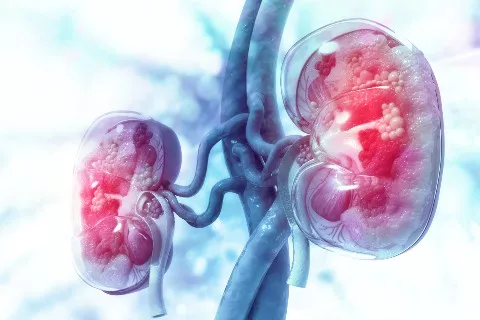
Our researchers have shown that a pioneering gene therapy can reduce early signs of kidney damage in mice with diabetes, paving the way to a new treatment to protect against one of the most serious and common complications of diabetes.
One in three people with diabetes will develop diabetic kidney disease, also known as diabetic nephropathy, during their lifetime. Current treatments can slow kidney damage but don’t act on the root of the problem.
Diabetic kidney disease starts in the glomerulus – tiny filters in the kidney. Normally a protein, called VEGFC, helps to keep the glomerulus blood vessel lining healthy. In diabetes, this lining can become damaged.
With our funding, Dr Rebecca Foster and a team at the University of Bristol have been developing a new gene therapy to prevent or repair early signs of this damage by boosting VEGFC in the glomerulus.
The therapy uses a harmless virus that acts like a microscopic postman to deliver the VEGFC gene directly into glomerulus cells.
The virus infects cells, and while the immune system then quickly eliminates the virus, its genetic cargo is left behind. This instructs the kidney filter cells to produce more of the protective protein.
In a study published in Molecular Therapy, Dr Foster and team showed that in mice with type 1 diabetes, the treatment increased VEGFC levels in the kidney and reduced protein leakage into the urine by around 64%. A drop of 30% or more is considered a meaningful sign that kidney damage is slowing down.
This is the first therapy to directly target the root of kidney disease in the glomerulus. The researchers also hope a one-time treatment could have a long-term protective effect.
Dr Rebecca Foster said:
“Our goal was to investigate whether gene therapy could offer a viable solution by delivering VEGFC in a more targeted way. This approach has not been explored before in pre-clinical models and offers a long-term solution for those who are at risk of developing kidney disease.”
While it's early-stage research in mice, the study shows the potential of this innovative gene therapy to offer an urgently needed way to intervene early, before irreversible kidney damage sets in.
Different forms of VEGFC gene therapy have already been tested in clinical trials involving people with breast cancer, indicating this type of treatment can be safe in humans. With further research and if shown to work in people with diabetes, this approach could lead to a completely new way to protect against kidney complications.
